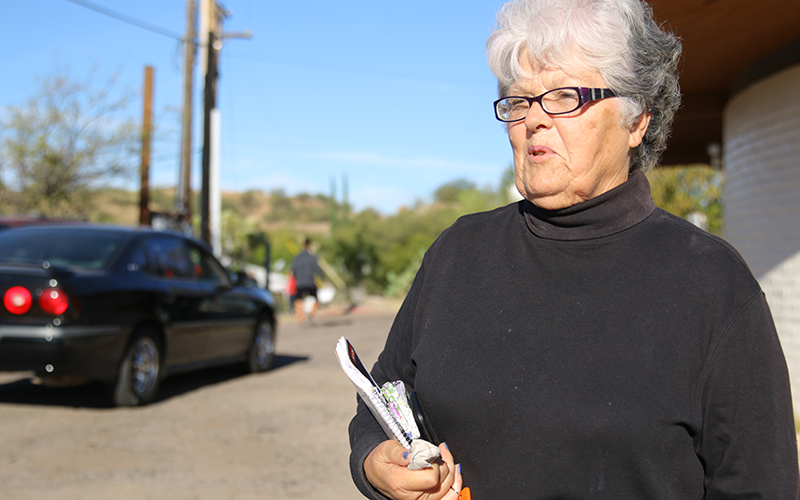
Gretchen Graef who lives in Sonora, Mexico, and is a dual citizen of Mexico and the U.S. voted at the VFW in Nogales on election day and said “We need to get back to civility.” (Photo by Zach Quinn/Cronkite News)
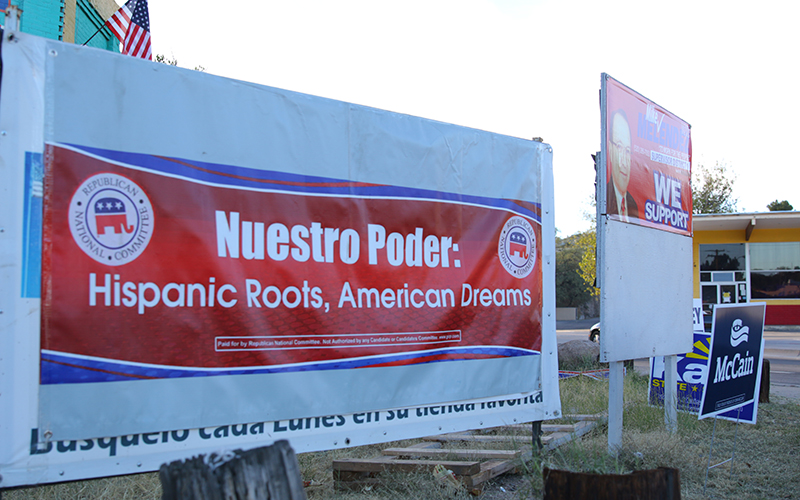
Exterior of the AZ GOP Nogales Office, 491 N Grand Ave in Nogales, Arizona. The sign reads “Our power.” (Photo by Zach Quinn/Cronkite News)
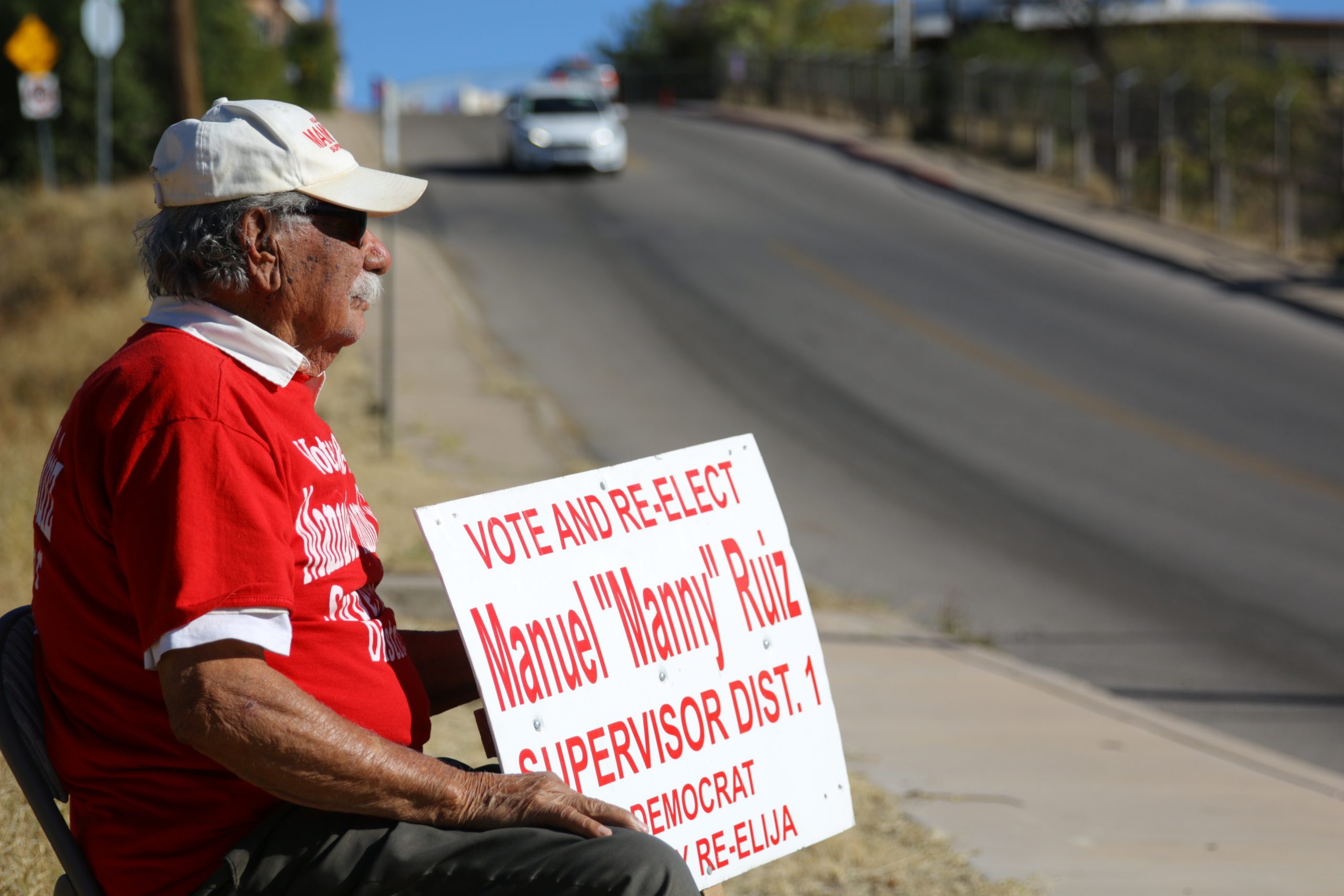
Santos Ruiz, 90, the father of Manuel Ruiz, a candidate for District 1 County Supervisor, watches as cars leave the polling place at VFW post # 2066 on 653 N Grand Avenue in Nogales, Arizona. (Photo by Zach Quinn/Cronkite News)
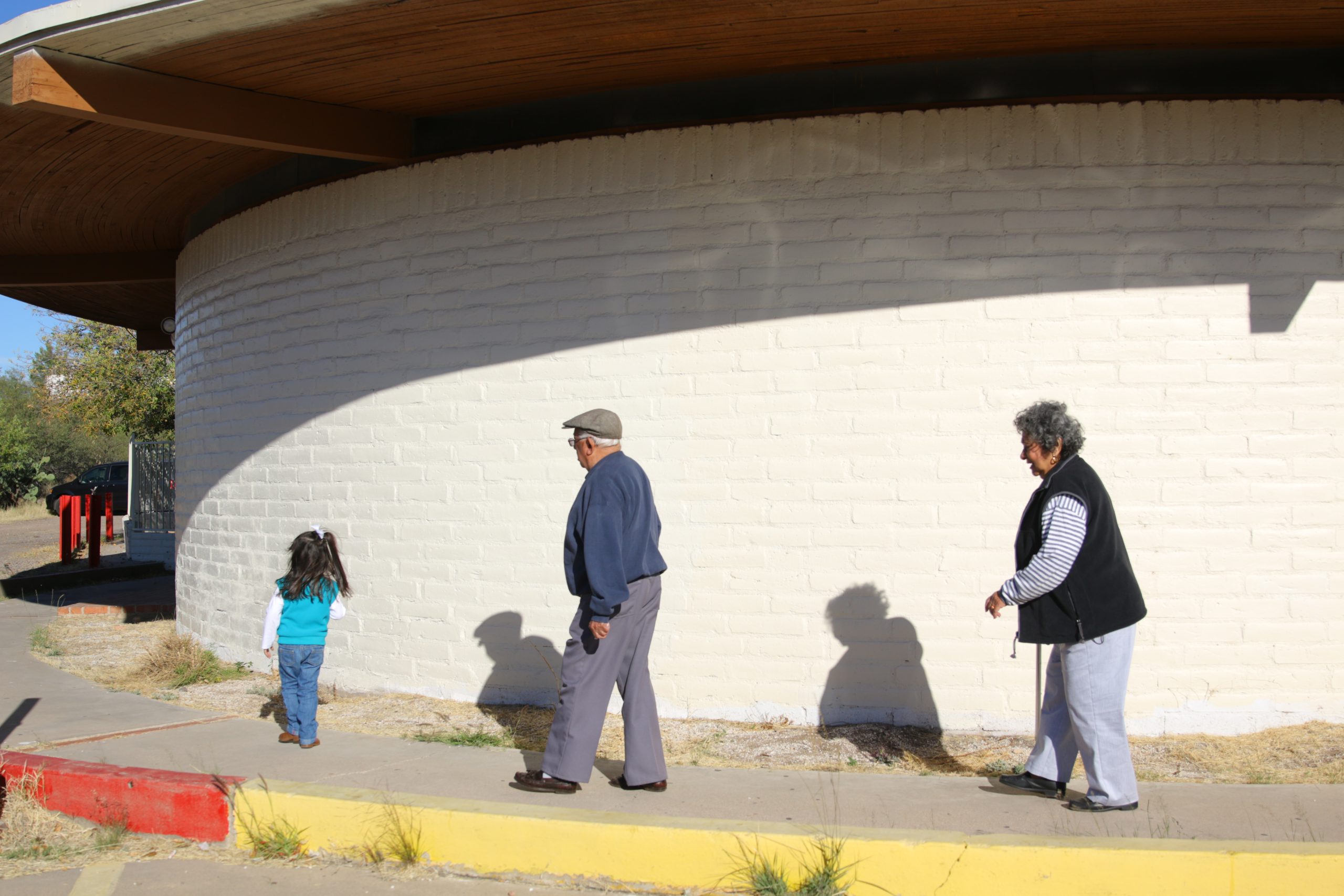
Voters leave the polling place at VFW post # 2066 on 653 N Grand Avenue in Nogales, Arizona. (Photo by Zach Quinn/Cronkite News)
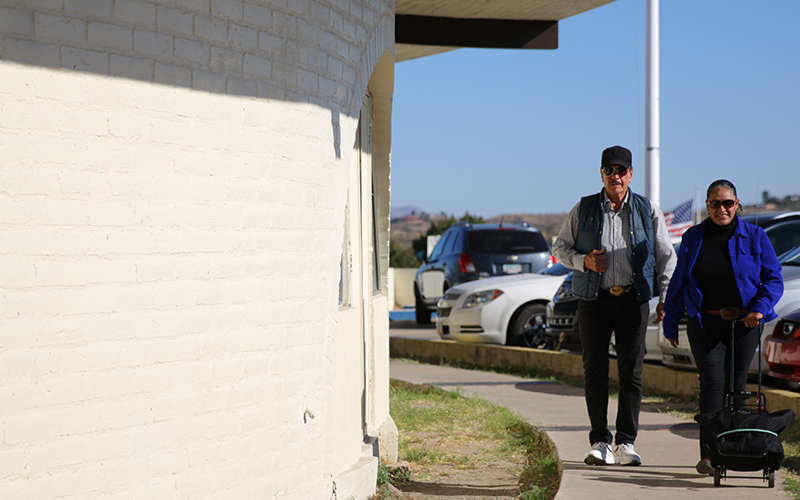
Voters leave the polling place at VFW post # 2066 on 653 N Grand Avenue in Nogales, Arizona. (Photo by Zach Quinn/Cronkite News)
NOGALES, Ariz. – The so-called Latino sleeping giant awoke in Nogales, a U.S. border town where voters said the stakes are unusually high.
Santa Cruz County, where the town is located, cast 9,674 ballots in the 2014 midterm elections, according to Santa Cruz County Recorder Office reports.
Early voting data compiled by Garrett Archer, assistant director of elections: information systems for the Arizona Secretary of State, showed that number was surpassed just by the county’s 9,809 early voters, before election day ballots were counted.
Many of the residents voting today said this was the biggest turnout they’ve seen in years from their community, which is almost 95 percent Latino. Lines got so long this election day that, as the day went on, voters were waiting more than an hour to vote.
Latinos in Arizona make up about a third of the state’s population. The voting bloc, which mostly supports Democrats according to Pew Research Center, was much sought after in this election.
Bonnie Atwood, a first-time voter, said she voted for Republican presidential nominee Donald Trump.
“I feel like for the first time in my life that every vote is counting now,” Atwood said.
The 40-year-old said she never voted before because she didn’t care about the outcome. But in this election, she said she felt her choice would truly make a difference.
She is Hispanic, but she said she is voting for Trump because she believes he will create jobs and spark change.
“Trump doesn’t know anything about politics,” she said. “But he’s a businessman.”
Atwood exited the polling booth with a wide smile, an American flag tank top on and her 4-year-old daughter by her side.
“It‘s up to me to decide the future I want for my kid,” said Atwood, a nurse in Nogales.
Gretchen Graef voted for Hillary Clinton. The Ph.D is 65 years old and lives in Sonora, Mexico. She has dual citizenship and voted today in Nogales on the U.S. side of the border.
She said she voted for Clinton because she believes the former secretary of state is more likely to bring America “back to civility.”
“With the stuff that’s on TV you would think that Mexico is all (a) bunch of drug runners and rapists,” Graef said.
She said Trump doesn’t know enough about politics to make big decisions for our country.
“The president of the United States needs to be able to be somewhat of a scholar” who can look at all sides of a problem before making a decision, she said. Trump “hasn’t shown any inclination” to learn about what’s happening in the world outside the U.S., Graef said
“I’m glad it’s going to be over,” Graef said about the elections.
For border residents in general, the stakes – immigration, trade, jobs and security – were unusually high.
Former Nogales mayor Marcelino Varona Jr. said the city depends on the retail sales driven by Mexican shoppers coming across the border because there is no property tax in Nogales.
Mexican visitors spend an average of 7.3 million dollars per day in Arizona, according to Arizona-Mexico Commission data from 2014.
Many Nogales residents on the U.S. side of the border also have relatives on the Mexican side and there were many voters that showed up to vote today who are dual citizens. Some waited more than an hour to cross over to the U.S. to vote and waited another hour to get into the polls once they arrived.
The polls opened at 6 a.m., and within minutes twenty cars were parked in front of the Veterans of Foreign Wars Post 2066, one of the four Nogales polling locations, while its owners voted inside before going to work.
By 7 a.m. the parking lot was full. A constant flow of cars came and went and at noon the polling location started having wait times of an hour or longer.
Nogales, which has a 94.99 percent Latino population, is so far defying the downward Latino voter trend which reached a record low of 27 percent in the 2014 elections.
Outreach efforts across the state focused heavily this year on increasing the Latino voter turnout for the election.
Varona said the increase in voter turnout is because the election this year is “very polarizing.”
“It’s divided our community, it’s divided our state, it’s divided our country,” he said.
“It’s a very decisive election.”
But one of the main takeaways from this election, Varona said, will be how much of an impact the Latino vote has in deciding elections.
“This presidential election, when all is said and done, the footprint of the Hispanic vote is going to be determined,” he said. Both parties will aim to attract this voting bloc in future elections, he said.
Latino voters across Arizona showed higher registration numbers a week ago than they did at the same point in time in 2012, the Arizona Republic reported.
Nogales resident Cecilia Montaño said the Latino community hasn’t voted in the past because they lacked education about the importance of the voting process. But now that their children are going to school, learning about the voting process, and bringing it back to their communities, the children and their parents are becoming more involved in the voting process.
“They’re our future,” Montaño said, who is an expecting grandmother.
She said her granddaughter will learn the importance of voting by hearing about it at home and having family members act as her role models.
“She’s going to see what her parent are doing, what her grandparents are doing and in school she’s going to be educated,” Montaño said.